Long-Term Effects of Political Violence: Narrative Inquiry Across a 20-Year Period
VerifiedAdded on 2023/04/23
|8
|1731
|171
AI Summary
This paper evaluates the way narrative inquiry methodology and interview have been used in order to reveal the enduring effects of violence across 20 year period on a diverse level. The study of long term impacts of political hostility typically shed light on consequences of single event or phase of violence on individuals or associations of individuals and tend to depend on recollection from people who encountered violence for significant time following the event.
Contribute Materials
Your contribution can guide someone’s learning journey. Share your
documents today.
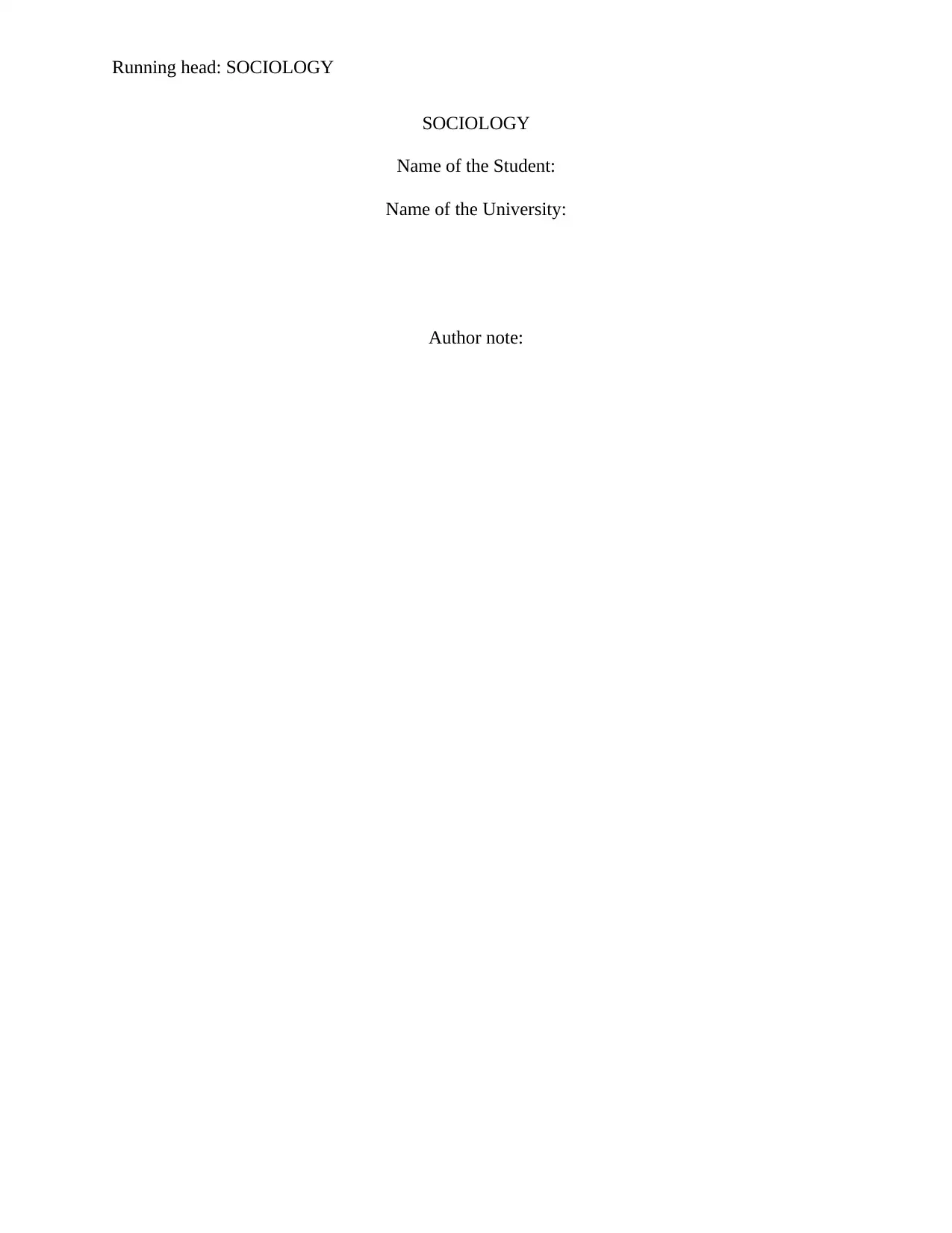
Running head: SOCIOLOGY
SOCIOLOGY
Name of the Student:
Name of the University:
Author note:
SOCIOLOGY
Name of the Student:
Name of the University:
Author note:
Secure Best Marks with AI Grader
Need help grading? Try our AI Grader for instant feedback on your assignments.
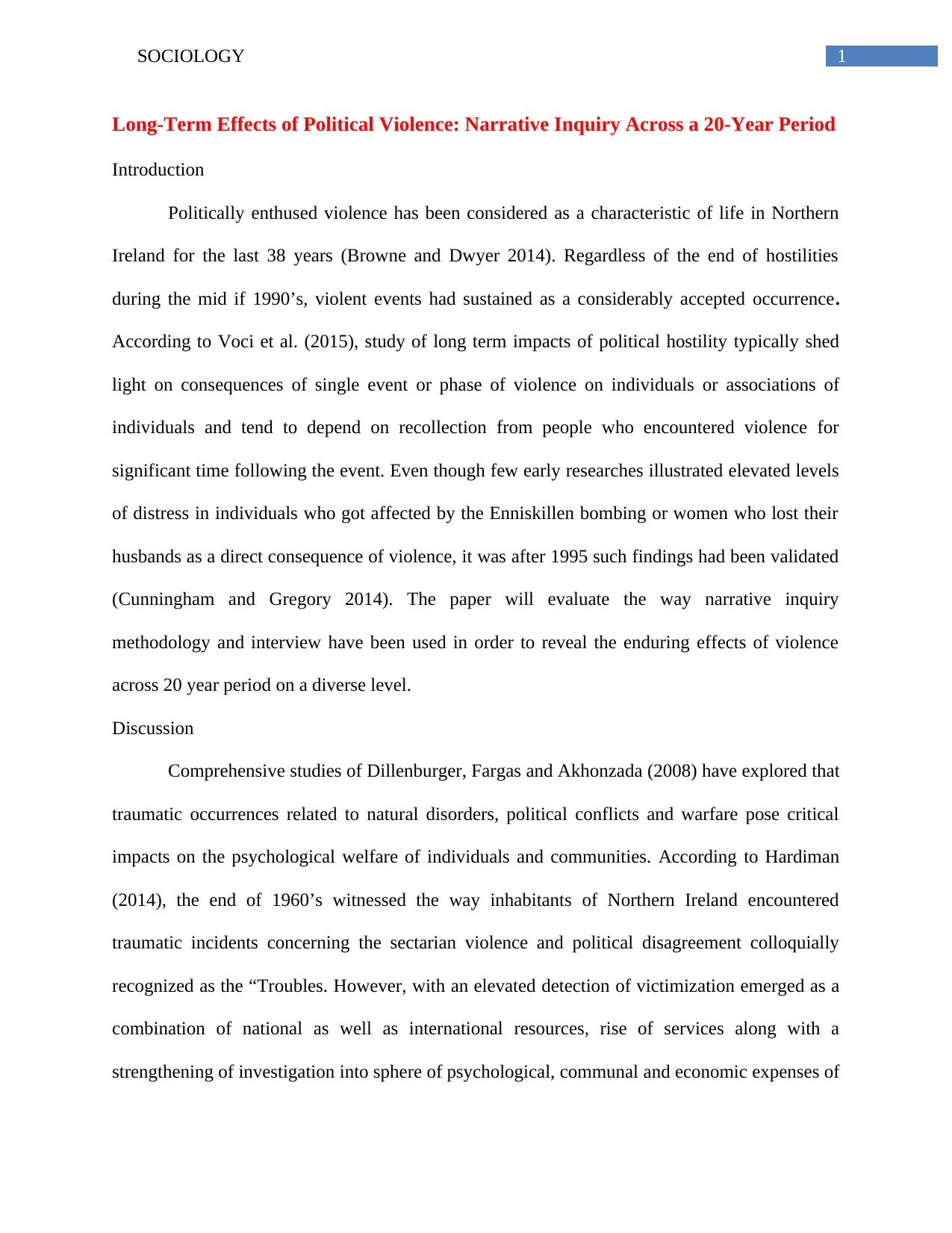
1SOCIOLOGY
Long-Term Effects of Political Violence: Narrative Inquiry Across a 20-Year Period
Introduction
Politically enthused violence has been considered as a characteristic of life in Northern
Ireland for the last 38 years (Browne and Dwyer 2014). Regardless of the end of hostilities
during the mid if 1990’s, violent events had sustained as a considerably accepted occurrence.
According to Voci et al. (2015), study of long term impacts of political hostility typically shed
light on consequences of single event or phase of violence on individuals or associations of
individuals and tend to depend on recollection from people who encountered violence for
significant time following the event. Even though few early researches illustrated elevated levels
of distress in individuals who got affected by the Enniskillen bombing or women who lost their
husbands as a direct consequence of violence, it was after 1995 such findings had been validated
(Cunningham and Gregory 2014). The paper will evaluate the way narrative inquiry
methodology and interview have been used in order to reveal the enduring effects of violence
across 20 year period on a diverse level.
Discussion
Comprehensive studies of Dillenburger, Fargas and Akhonzada (2008) have explored that
traumatic occurrences related to natural disorders, political conflicts and warfare pose critical
impacts on the psychological welfare of individuals and communities. According to Hardiman
(2014), the end of 1960’s witnessed the way inhabitants of Northern Ireland encountered
traumatic incidents concerning the sectarian violence and political disagreement colloquially
recognized as the “Troubles. However, with an elevated detection of victimization emerged as a
combination of national as well as international resources, rise of services along with a
strengthening of investigation into sphere of psychological, communal and economic expenses of
Long-Term Effects of Political Violence: Narrative Inquiry Across a 20-Year Period
Introduction
Politically enthused violence has been considered as a characteristic of life in Northern
Ireland for the last 38 years (Browne and Dwyer 2014). Regardless of the end of hostilities
during the mid if 1990’s, violent events had sustained as a considerably accepted occurrence.
According to Voci et al. (2015), study of long term impacts of political hostility typically shed
light on consequences of single event or phase of violence on individuals or associations of
individuals and tend to depend on recollection from people who encountered violence for
significant time following the event. Even though few early researches illustrated elevated levels
of distress in individuals who got affected by the Enniskillen bombing or women who lost their
husbands as a direct consequence of violence, it was after 1995 such findings had been validated
(Cunningham and Gregory 2014). The paper will evaluate the way narrative inquiry
methodology and interview have been used in order to reveal the enduring effects of violence
across 20 year period on a diverse level.
Discussion
Comprehensive studies of Dillenburger, Fargas and Akhonzada (2008) have explored that
traumatic occurrences related to natural disorders, political conflicts and warfare pose critical
impacts on the psychological welfare of individuals and communities. According to Hardiman
(2014), the end of 1960’s witnessed the way inhabitants of Northern Ireland encountered
traumatic incidents concerning the sectarian violence and political disagreement colloquially
recognized as the “Troubles. However, with an elevated detection of victimization emerged as a
combination of national as well as international resources, rise of services along with a
strengthening of investigation into sphere of psychological, communal and economic expenses of
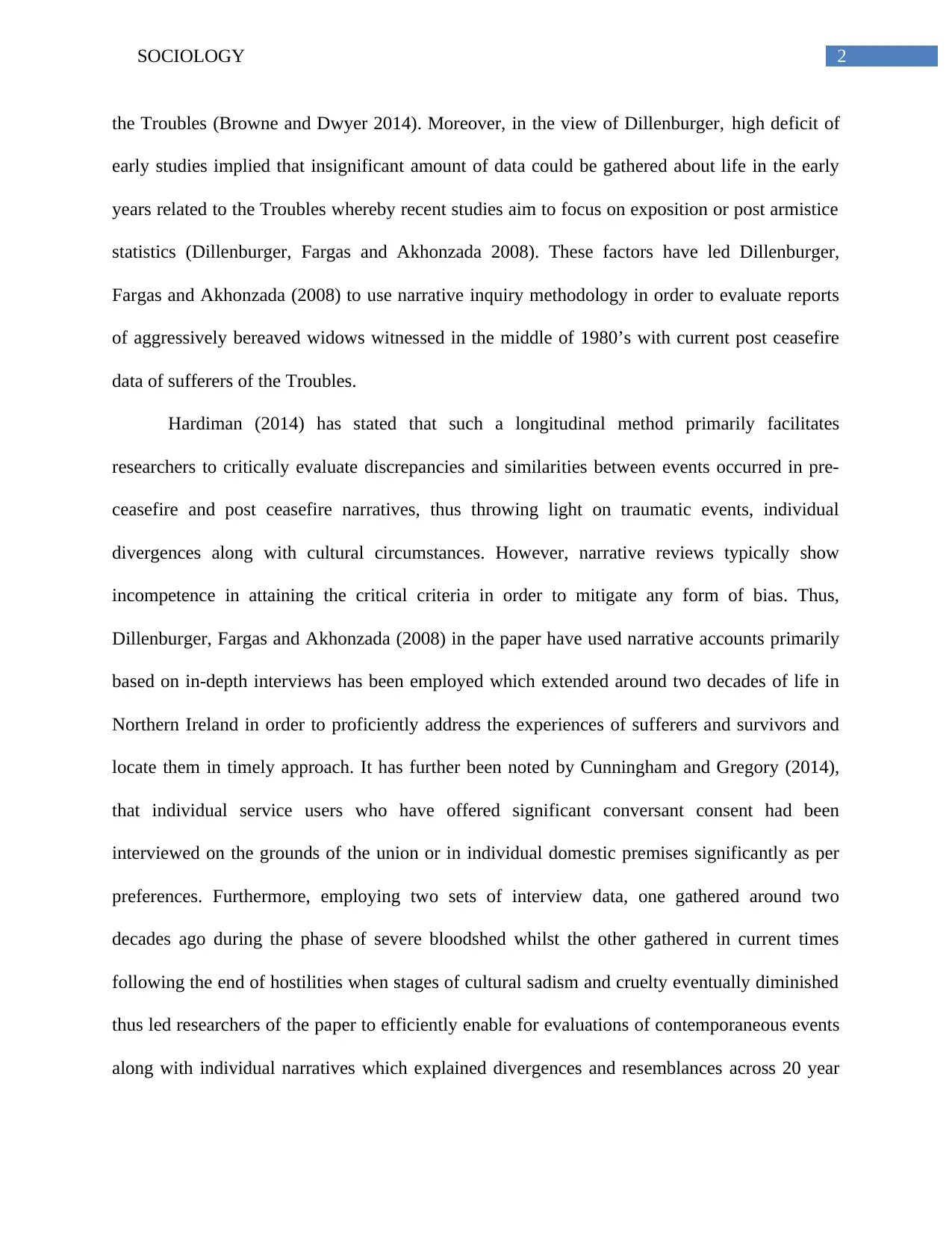
2SOCIOLOGY
the Troubles (Browne and Dwyer 2014). Moreover, in the view of Dillenburger, high deficit of
early studies implied that insignificant amount of data could be gathered about life in the early
years related to the Troubles whereby recent studies aim to focus on exposition or post armistice
statistics (Dillenburger, Fargas and Akhonzada 2008). These factors have led Dillenburger,
Fargas and Akhonzada (2008) to use narrative inquiry methodology in order to evaluate reports
of aggressively bereaved widows witnessed in the middle of 1980’s with current post ceasefire
data of sufferers of the Troubles.
Hardiman (2014) has stated that such a longitudinal method primarily facilitates
researchers to critically evaluate discrepancies and similarities between events occurred in pre-
ceasefire and post ceasefire narratives, thus throwing light on traumatic events, individual
divergences along with cultural circumstances. However, narrative reviews typically show
incompetence in attaining the critical criteria in order to mitigate any form of bias. Thus,
Dillenburger, Fargas and Akhonzada (2008) in the paper have used narrative accounts primarily
based on in-depth interviews has been employed which extended around two decades of life in
Northern Ireland in order to proficiently address the experiences of sufferers and survivors and
locate them in timely approach. It has further been noted by Cunningham and Gregory (2014),
that individual service users who have offered significant conversant consent had been
interviewed on the grounds of the union or in individual domestic premises significantly as per
preferences. Furthermore, employing two sets of interview data, one gathered around two
decades ago during the phase of severe bloodshed whilst the other gathered in current times
following the end of hostilities when stages of cultural sadism and cruelty eventually diminished
thus led researchers of the paper to efficiently enable for evaluations of contemporaneous events
along with individual narratives which explained divergences and resemblances across 20 year
the Troubles (Browne and Dwyer 2014). Moreover, in the view of Dillenburger, high deficit of
early studies implied that insignificant amount of data could be gathered about life in the early
years related to the Troubles whereby recent studies aim to focus on exposition or post armistice
statistics (Dillenburger, Fargas and Akhonzada 2008). These factors have led Dillenburger,
Fargas and Akhonzada (2008) to use narrative inquiry methodology in order to evaluate reports
of aggressively bereaved widows witnessed in the middle of 1980’s with current post ceasefire
data of sufferers of the Troubles.
Hardiman (2014) has stated that such a longitudinal method primarily facilitates
researchers to critically evaluate discrepancies and similarities between events occurred in pre-
ceasefire and post ceasefire narratives, thus throwing light on traumatic events, individual
divergences along with cultural circumstances. However, narrative reviews typically show
incompetence in attaining the critical criteria in order to mitigate any form of bias. Thus,
Dillenburger, Fargas and Akhonzada (2008) in the paper have used narrative accounts primarily
based on in-depth interviews has been employed which extended around two decades of life in
Northern Ireland in order to proficiently address the experiences of sufferers and survivors and
locate them in timely approach. It has further been noted by Cunningham and Gregory (2014),
that individual service users who have offered significant conversant consent had been
interviewed on the grounds of the union or in individual domestic premises significantly as per
preferences. Furthermore, employing two sets of interview data, one gathered around two
decades ago during the phase of severe bloodshed whilst the other gathered in current times
following the end of hostilities when stages of cultural sadism and cruelty eventually diminished
thus led researchers of the paper to efficiently enable for evaluations of contemporaneous events
along with individual narratives which explained divergences and resemblances across 20 year
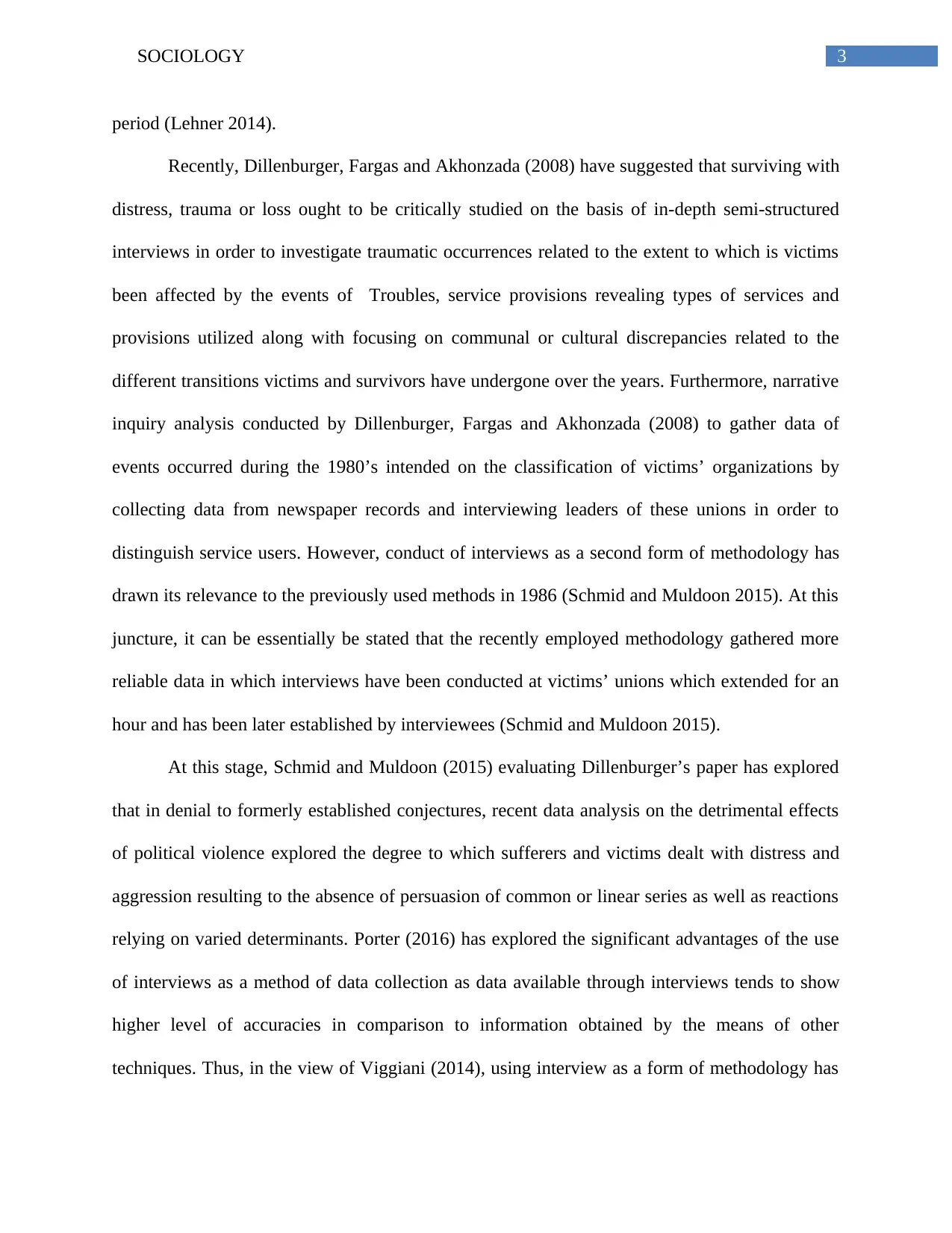
3SOCIOLOGY
period (Lehner 2014).
Recently, Dillenburger, Fargas and Akhonzada (2008) have suggested that surviving with
distress, trauma or loss ought to be critically studied on the basis of in-depth semi-structured
interviews in order to investigate traumatic occurrences related to the extent to which is victims
been affected by the events of Troubles, service provisions revealing types of services and
provisions utilized along with focusing on communal or cultural discrepancies related to the
different transitions victims and survivors have undergone over the years. Furthermore, narrative
inquiry analysis conducted by Dillenburger, Fargas and Akhonzada (2008) to gather data of
events occurred during the 1980’s intended on the classification of victims’ organizations by
collecting data from newspaper records and interviewing leaders of these unions in order to
distinguish service users. However, conduct of interviews as a second form of methodology has
drawn its relevance to the previously used methods in 1986 (Schmid and Muldoon 2015). At this
juncture, it can be essentially be stated that the recently employed methodology gathered more
reliable data in which interviews have been conducted at victims’ unions which extended for an
hour and has been later established by interviewees (Schmid and Muldoon 2015).
At this stage, Schmid and Muldoon (2015) evaluating Dillenburger’s paper has explored
that in denial to formerly established conjectures, recent data analysis on the detrimental effects
of political violence explored the degree to which sufferers and victims dealt with distress and
aggression resulting to the absence of persuasion of common or linear series as well as reactions
relying on varied determinants. Porter (2016) has explored the significant advantages of the use
of interviews as a method of data collection as data available through interviews tends to show
higher level of accuracies in comparison to information obtained by the means of other
techniques. Thus, in the view of Viggiani (2014), using interview as a form of methodology has
period (Lehner 2014).
Recently, Dillenburger, Fargas and Akhonzada (2008) have suggested that surviving with
distress, trauma or loss ought to be critically studied on the basis of in-depth semi-structured
interviews in order to investigate traumatic occurrences related to the extent to which is victims
been affected by the events of Troubles, service provisions revealing types of services and
provisions utilized along with focusing on communal or cultural discrepancies related to the
different transitions victims and survivors have undergone over the years. Furthermore, narrative
inquiry analysis conducted by Dillenburger, Fargas and Akhonzada (2008) to gather data of
events occurred during the 1980’s intended on the classification of victims’ organizations by
collecting data from newspaper records and interviewing leaders of these unions in order to
distinguish service users. However, conduct of interviews as a second form of methodology has
drawn its relevance to the previously used methods in 1986 (Schmid and Muldoon 2015). At this
juncture, it can be essentially be stated that the recently employed methodology gathered more
reliable data in which interviews have been conducted at victims’ unions which extended for an
hour and has been later established by interviewees (Schmid and Muldoon 2015).
At this stage, Schmid and Muldoon (2015) evaluating Dillenburger’s paper has explored
that in denial to formerly established conjectures, recent data analysis on the detrimental effects
of political violence explored the degree to which sufferers and victims dealt with distress and
aggression resulting to the absence of persuasion of common or linear series as well as reactions
relying on varied determinants. Porter (2016) has explored the significant advantages of the use
of interviews as a method of data collection as data available through interviews tends to show
higher level of accuracies in comparison to information obtained by the means of other
techniques. Thus, in the view of Viggiani (2014), using interview as a form of methodology has
Secure Best Marks with AI Grader
Need help grading? Try our AI Grader for instant feedback on your assignments.
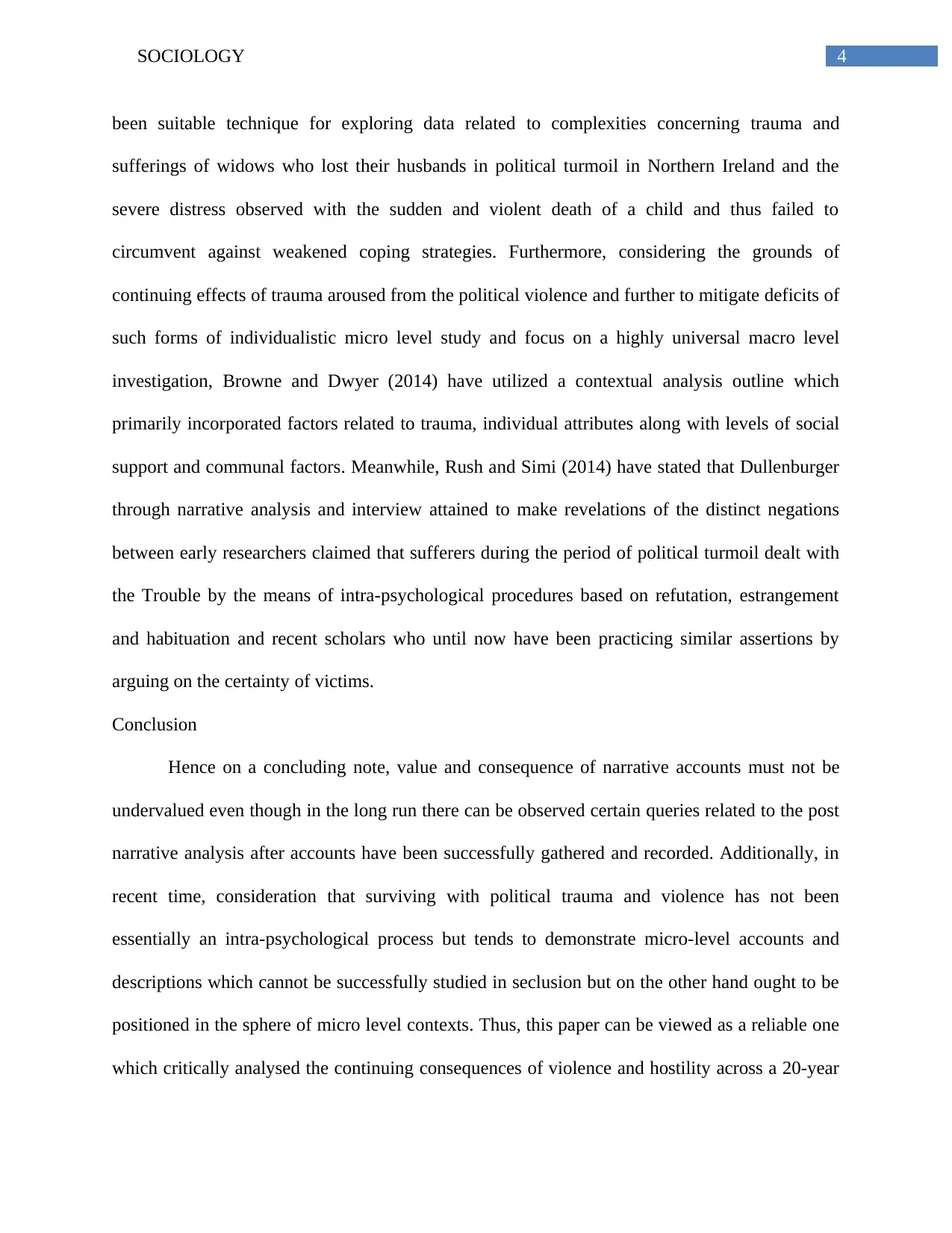
4SOCIOLOGY
been suitable technique for exploring data related to complexities concerning trauma and
sufferings of widows who lost their husbands in political turmoil in Northern Ireland and the
severe distress observed with the sudden and violent death of a child and thus failed to
circumvent against weakened coping strategies. Furthermore, considering the grounds of
continuing effects of trauma aroused from the political violence and further to mitigate deficits of
such forms of individualistic micro level study and focus on a highly universal macro level
investigation, Browne and Dwyer (2014) have utilized a contextual analysis outline which
primarily incorporated factors related to trauma, individual attributes along with levels of social
support and communal factors. Meanwhile, Rush and Simi (2014) have stated that Dullenburger
through narrative analysis and interview attained to make revelations of the distinct negations
between early researchers claimed that sufferers during the period of political turmoil dealt with
the Trouble by the means of intra-psychological procedures based on refutation, estrangement
and habituation and recent scholars who until now have been practicing similar assertions by
arguing on the certainty of victims.
Conclusion
Hence on a concluding note, value and consequence of narrative accounts must not be
undervalued even though in the long run there can be observed certain queries related to the post
narrative analysis after accounts have been successfully gathered and recorded. Additionally, in
recent time, consideration that surviving with political trauma and violence has not been
essentially an intra-psychological process but tends to demonstrate micro-level accounts and
descriptions which cannot be successfully studied in seclusion but on the other hand ought to be
positioned in the sphere of micro level contexts. Thus, this paper can be viewed as a reliable one
which critically analysed the continuing consequences of violence and hostility across a 20-year
been suitable technique for exploring data related to complexities concerning trauma and
sufferings of widows who lost their husbands in political turmoil in Northern Ireland and the
severe distress observed with the sudden and violent death of a child and thus failed to
circumvent against weakened coping strategies. Furthermore, considering the grounds of
continuing effects of trauma aroused from the political violence and further to mitigate deficits of
such forms of individualistic micro level study and focus on a highly universal macro level
investigation, Browne and Dwyer (2014) have utilized a contextual analysis outline which
primarily incorporated factors related to trauma, individual attributes along with levels of social
support and communal factors. Meanwhile, Rush and Simi (2014) have stated that Dullenburger
through narrative analysis and interview attained to make revelations of the distinct negations
between early researchers claimed that sufferers during the period of political turmoil dealt with
the Trouble by the means of intra-psychological procedures based on refutation, estrangement
and habituation and recent scholars who until now have been practicing similar assertions by
arguing on the certainty of victims.
Conclusion
Hence on a concluding note, value and consequence of narrative accounts must not be
undervalued even though in the long run there can be observed certain queries related to the post
narrative analysis after accounts have been successfully gathered and recorded. Additionally, in
recent time, consideration that surviving with political trauma and violence has not been
essentially an intra-psychological process but tends to demonstrate micro-level accounts and
descriptions which cannot be successfully studied in seclusion but on the other hand ought to be
positioned in the sphere of micro level contexts. Thus, this paper can be viewed as a reliable one
which critically analysed the continuing consequences of violence and hostility across a 20-year

5SOCIOLOGY
period on a diverse level and further can be used by other scholars in order to elucidate and
record the learning histories of individuals and communities.
period on a diverse level and further can be used by other scholars in order to elucidate and
record the learning histories of individuals and communities.
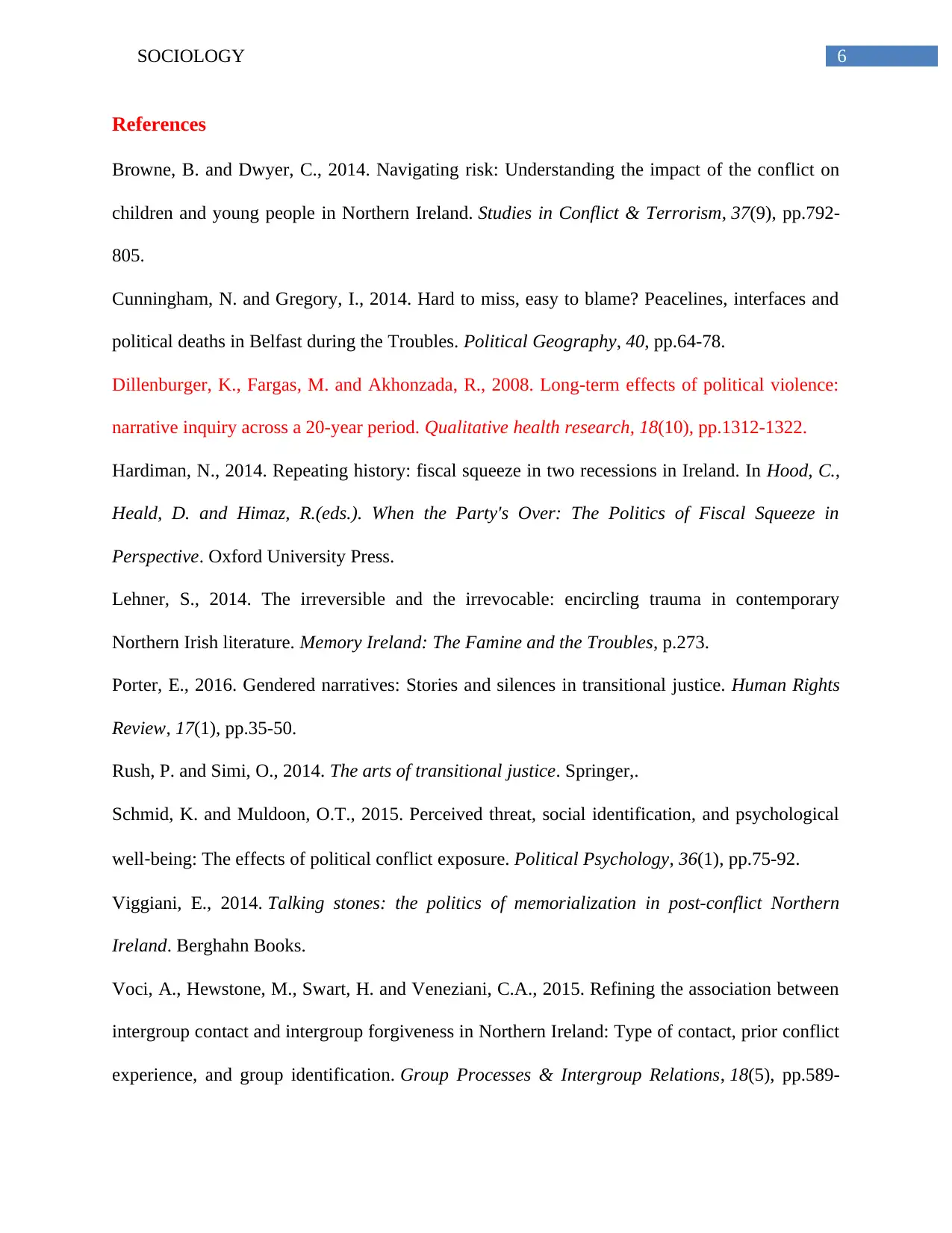
6SOCIOLOGY
References
Browne, B. and Dwyer, C., 2014. Navigating risk: Understanding the impact of the conflict on
children and young people in Northern Ireland. Studies in Conflict & Terrorism, 37(9), pp.792-
805.
Cunningham, N. and Gregory, I., 2014. Hard to miss, easy to blame? Peacelines, interfaces and
political deaths in Belfast during the Troubles. Political Geography, 40, pp.64-78.
Dillenburger, K., Fargas, M. and Akhonzada, R., 2008. Long-term effects of political violence:
narrative inquiry across a 20-year period. Qualitative health research, 18(10), pp.1312-1322.
Hardiman, N., 2014. Repeating history: fiscal squeeze in two recessions in Ireland. In Hood, C.,
Heald, D. and Himaz, R.(eds.). When the Party's Over: The Politics of Fiscal Squeeze in
Perspective. Oxford University Press.
Lehner, S., 2014. The irreversible and the irrevocable: encircling trauma in contemporary
Northern Irish literature. Memory Ireland: The Famine and the Troubles, p.273.
Porter, E., 2016. Gendered narratives: Stories and silences in transitional justice. Human Rights
Review, 17(1), pp.35-50.
Rush, P. and Simi, O., 2014. The arts of transitional justice. Springer,.
Schmid, K. and Muldoon, O.T., 2015. Perceived threat, social identification, and psychological
well‐being: The effects of political conflict exposure. Political Psychology, 36(1), pp.75-92.
Viggiani, E., 2014. Talking stones: the politics of memorialization in post-conflict Northern
Ireland. Berghahn Books.
Voci, A., Hewstone, M., Swart, H. and Veneziani, C.A., 2015. Refining the association between
intergroup contact and intergroup forgiveness in Northern Ireland: Type of contact, prior conflict
experience, and group identification. Group Processes & Intergroup Relations, 18(5), pp.589-
References
Browne, B. and Dwyer, C., 2014. Navigating risk: Understanding the impact of the conflict on
children and young people in Northern Ireland. Studies in Conflict & Terrorism, 37(9), pp.792-
805.
Cunningham, N. and Gregory, I., 2014. Hard to miss, easy to blame? Peacelines, interfaces and
political deaths in Belfast during the Troubles. Political Geography, 40, pp.64-78.
Dillenburger, K., Fargas, M. and Akhonzada, R., 2008. Long-term effects of political violence:
narrative inquiry across a 20-year period. Qualitative health research, 18(10), pp.1312-1322.
Hardiman, N., 2014. Repeating history: fiscal squeeze in two recessions in Ireland. In Hood, C.,
Heald, D. and Himaz, R.(eds.). When the Party's Over: The Politics of Fiscal Squeeze in
Perspective. Oxford University Press.
Lehner, S., 2014. The irreversible and the irrevocable: encircling trauma in contemporary
Northern Irish literature. Memory Ireland: The Famine and the Troubles, p.273.
Porter, E., 2016. Gendered narratives: Stories and silences in transitional justice. Human Rights
Review, 17(1), pp.35-50.
Rush, P. and Simi, O., 2014. The arts of transitional justice. Springer,.
Schmid, K. and Muldoon, O.T., 2015. Perceived threat, social identification, and psychological
well‐being: The effects of political conflict exposure. Political Psychology, 36(1), pp.75-92.
Viggiani, E., 2014. Talking stones: the politics of memorialization in post-conflict Northern
Ireland. Berghahn Books.
Voci, A., Hewstone, M., Swart, H. and Veneziani, C.A., 2015. Refining the association between
intergroup contact and intergroup forgiveness in Northern Ireland: Type of contact, prior conflict
experience, and group identification. Group Processes & Intergroup Relations, 18(5), pp.589-
Paraphrase This Document
Need a fresh take? Get an instant paraphrase of this document with our AI Paraphraser

7SOCIOLOGY
608.
608.
1 out of 8
Your All-in-One AI-Powered Toolkit for Academic Success.
+13062052269
info@desklib.com
Available 24*7 on WhatsApp / Email
![[object Object]](/_next/static/media/star-bottom.7253800d.svg)
Unlock your academic potential
© 2024 | Zucol Services PVT LTD | All rights reserved.